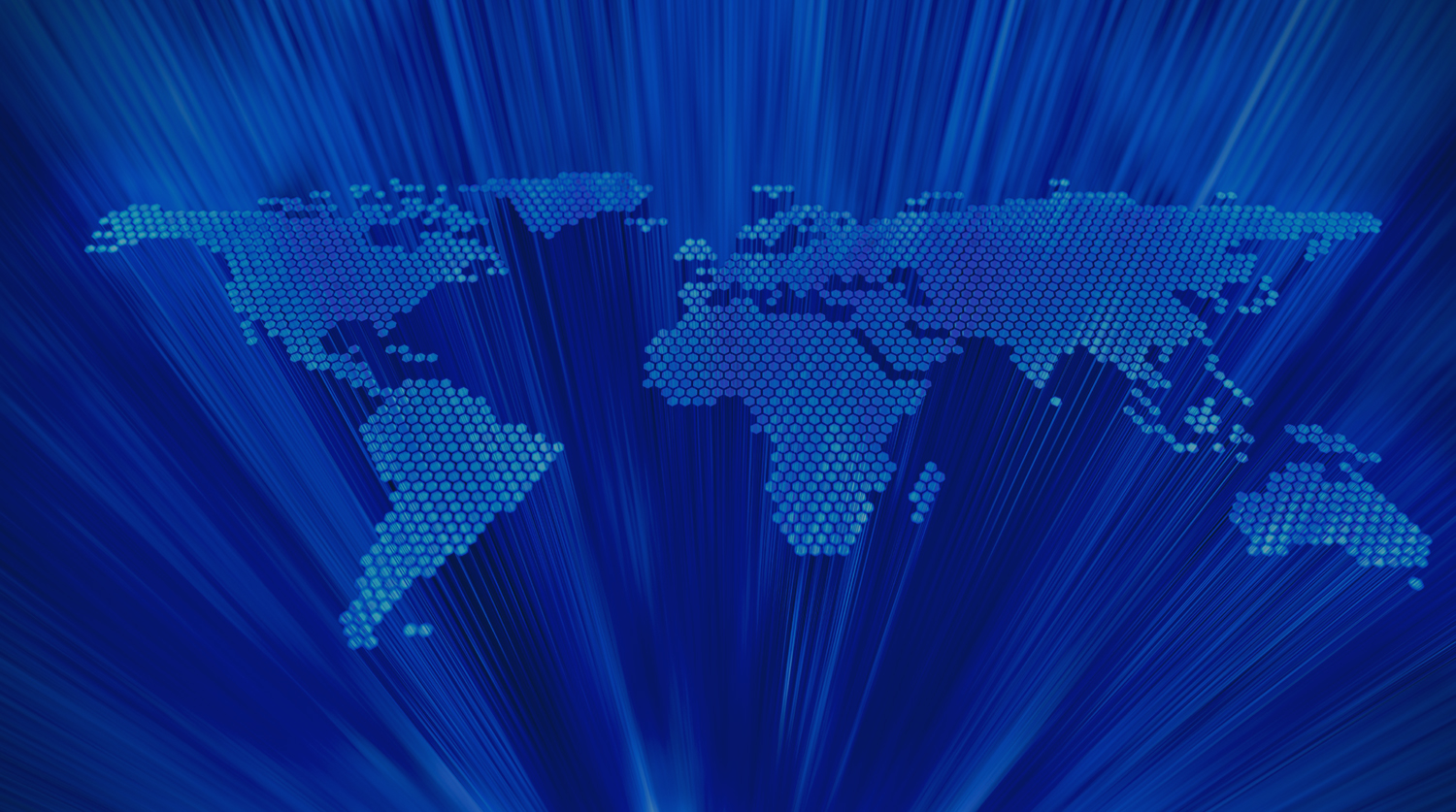The Philippines call center industry is evolving fast—and AI is the accelerant.
Once known primarily for its English fluency and cultural compatibility, Philippine BPOs are now becoming AI-driven CX innovators. From predictive analytics and multilingual NLP chatbots to data-enriched personalization, these call centers are setting new standards for global customer experience.
In this post, we’ll explore how AI is transforming the Philippines call center sector—and why that matters for any company outsourcing (or considering it) in 2025.
How Philippine Call Centers Lead the AI Revolution in CX
The Current State of AI Adoption
The Philippine call center industry has embraced AI technologies, transforming customer experience (CX). This shift represents a strategic move to maintain the country’s global leadership in outsourcing services.
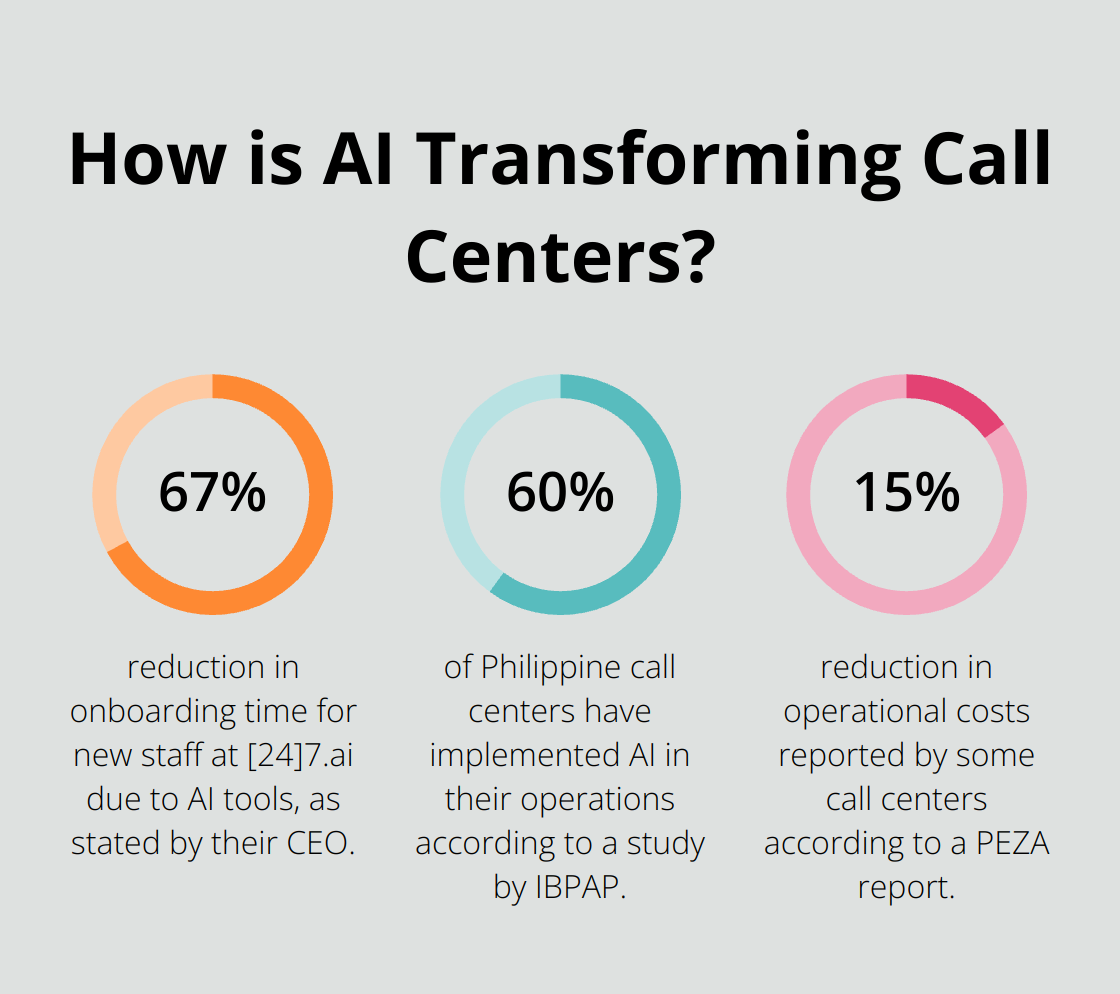
A recent study by the IT and Business Process Association of the Philippines (IBPAP) reveals that over 60% of Philippine call centers have implemented AI in their operations. This adoption rate is projected to reach 85% by 2026, demonstrating the industry’s commitment to innovation.
Major players have reported significant operational improvements. For instance, [24]7.ai’s CEO, PV Kannan, stated that AI tools have slashed new staff training time from 90 days to just one month (a 67% reduction in onboarding time).
Driving Forces Behind AI Integration
Several factors propel AI integration in Philippine call centers:
- The need to remain competitive in a global market where clients demand faster, more efficient, and personalized customer service.
- The potential for substantial cost reduction and improved operational efficiency.
An Avasant study predicts that AI will create 100,000 new jobs in algorithm training and data curation within the next five years. This shift indicates a transformation in required skill sets, moving towards more technical and AI-focused roles.
AI Technologies in Action
Philippine call centers implement various AI technologies to enhance their services:
- Natural Language Processing (NLP) chatbots: These AI-powered assistants handle routine inquiries, allowing human agents to focus on complex issues. NLP transforms call centers through voice recognition, multilingual support, and human-like conversations.
- AI-driven speech analytics: This tool analyzes customer calls in real-time, providing agents with instant feedback and suggestions to improve interactions. AI is taking on more responsibility in gatekeeping customer calls and asking questions before human agents intervene.
- Predictive analytics: This technology forecasts call volumes and optimizes staffing levels. Some call centers have reported a 15% reduction in operational costs, according to a Philippine Economic Zone Authority (PEZA) report.
The integration of AI in Philippine call centers reimagines the entire customer experience. As these centers continue to spearhead the AI revolution in CX, businesses worldwide stand to benefit from more efficient, personalized, and effective customer service solutions.
So, what does it look like in action?
Let’s break down how these technologies show up inside a modern Philippines call center:
🤖 NLP-Powered Chatbots
-
Handle FAQs and simple queries
-
Offer multilingual support with human-like accuracy
-
Let agents focus on complex, high-empathy interactions
📊 Speech & Sentiment Analytics
-
Analyze tone, urgency, and keywords in real-time
-
Offer instant coaching cues to improve agent performance
-
Boost CSAT by solving issues before escalation
🔮 Predictive Analytics
-
Forecast call volumes to optimize staffing
-
Anticipate churn, upsell opportunities, and service needs
-
Cut operational costs by up to 15% (according to PEZA)
🎯 Hyper-Personalization Engines
-
Use customer data to tailor scripts and service paths
-
Increase retention and conversion through customized experiences
🌍 Real-Time Language Translation
-
Unlock support for Spanish, French, Mandarin, and beyond
-
Open new markets without expanding agent language training
The Role of Outsourcing Consultants
In this rapidly evolving landscape, partnering with experienced outsourcing consultants (such as Outsource Consultants) becomes increasingly valuable. These experts can guide businesses through the complex process of selecting and implementing AI-powered call center solutions that align with their specific needs and goals.
How AI Transforms Philippine Call Centers
Supercharging Customer Service
AI-powered tools in Philippine call centers have dramatically improved performance metrics, including higher first-call resolution rates. Chatbots equipped with Natural Language Processing (NLP) now handle a significant portion of routine customer inquiries. This allows human agents to focus on complex issues, which has led to an increase in first-call resolution rates.
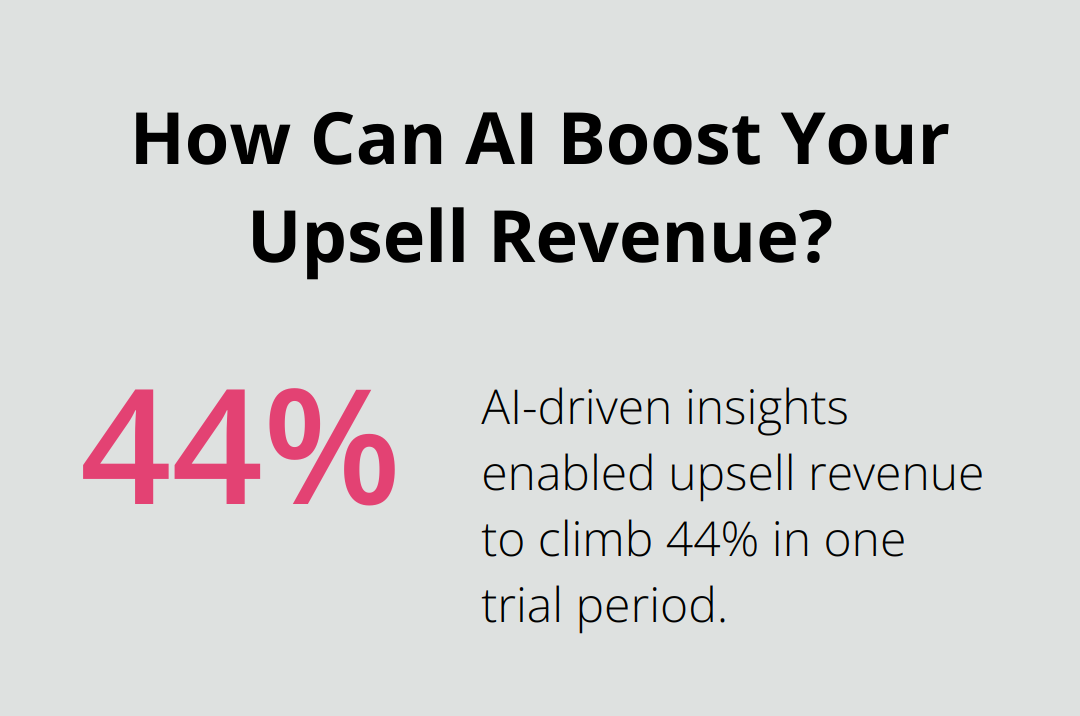
AI-driven speech analytics provide real-time feedback to agents, which enhances the quality of customer interactions. Philippine call centers have reported improvements in customer satisfaction scores after implementing this technology.
Slashing Operational Costs
The cost-saving potential of AI in Philippine call centers is substantial. Predictive analytics for workforce management has reduced overstaffing, which translates to significant savings. AI-powered self-service options have decreased call volumes, which further optimizes resource allocation.
These efficiencies have allowed Philippine call centers to offer more competitive pricing without compromising service quality. For businesses looking to outsource, this means access to top-tier CX solutions at a fraction of the cost of in-house operations.
Unlocking Data-Driven Insights
AI’s ability to process vast amounts of data transforms how Philippine call centers make strategic decisions. Advanced analytics tools can identify patterns in customer behavior, which allows for proactive problem-solving and personalized service offerings.
A case study showed that AI-driven insights enabled upsell revenue to climb 44% in one trial period. These data-driven strategies help businesses not just react to customer needs, but anticipate them.
Enhancing Multilingual Support
AI has significantly improved the multilingual capabilities of Philippine call centers. Advanced language models can now provide real-time translation and interpretation services, which allows agents to communicate effectively with customers from diverse linguistic backgrounds. This expansion of language support (without the need for extensive language training) has opened up new markets for Philippine call centers and their clients.
Personalizing Customer Experiences
AI algorithms analyze customer data to create detailed profiles and predict individual preferences. This enables Philippine call centers to offer highly personalized services. For example, an e-commerce company partnering with a Philippine call center reported an increase in customer retention after implementing AI-driven personalization strategies.
The AI revolution in Philippine call centers continues to set new global standards for exceptional CX in the digital age. As we move forward, it’s important to consider the challenges and solutions in AI implementation, which we’ll explore in the next section.
Workforce Transformation
The integration of AI in Philippine call centers requires significant workforce upskilling. The IT and Business Process Association of the Philippines (IBPAP) reports that 48% of BPO employees need substantial reskilling to work effectively with AI systems. To address this challenge, many Philippine call centers implement comprehensive training programs.
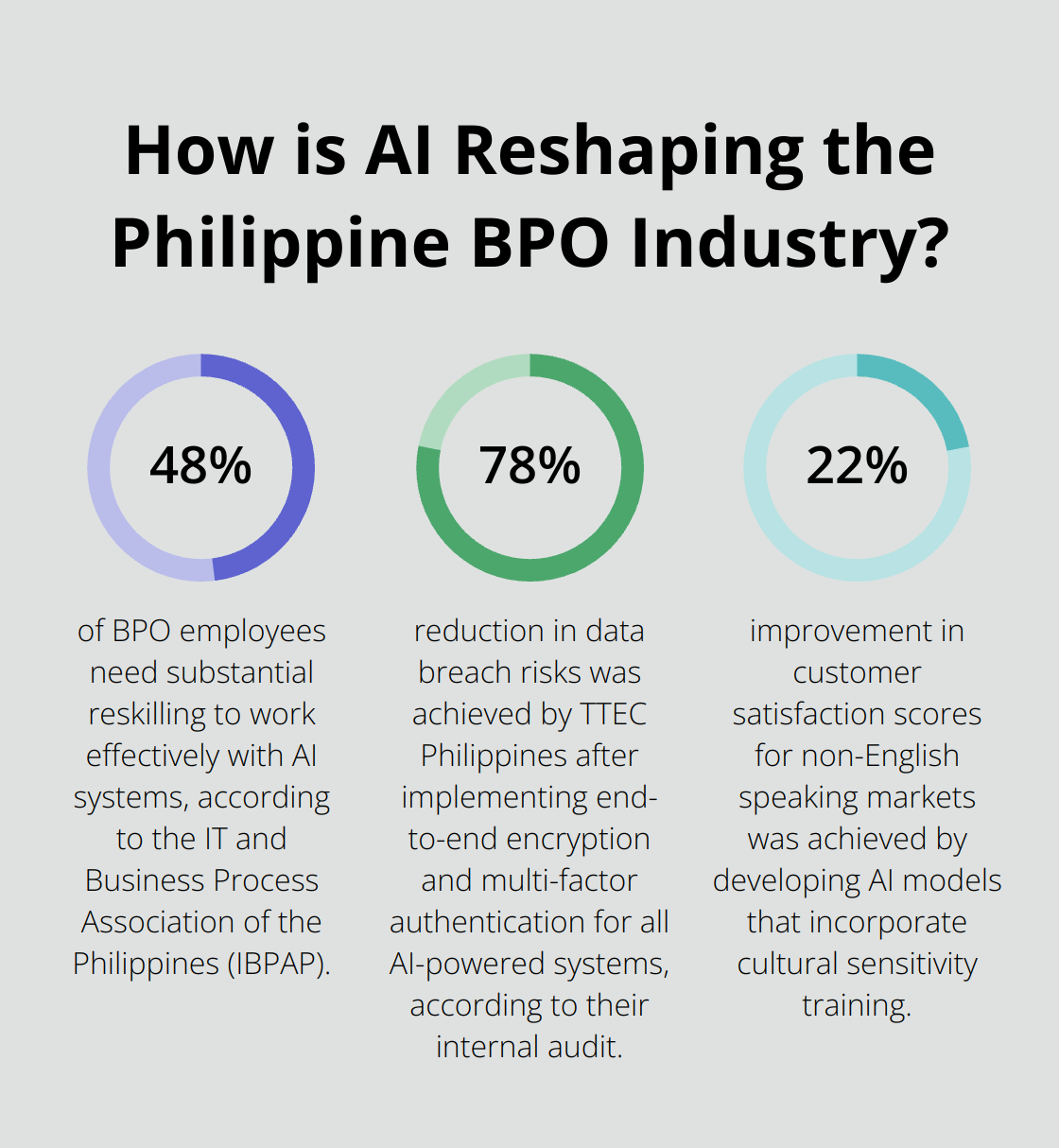
Teleperformance Philippines launched its TP AI Academy, offering courses in AI fundamentals, data analytics, and machine learning. This initiative aims to equip employees with AI skills by the end of 2025. The updated national strategy includes more comprehensive AI training programs and increased funding for AI education.
Human-AI Synergy
Philippine call centers face the challenge of striking the right balance between AI automation and human interaction. While AI handles routine tasks efficiently, complex issues often require human empathy and problem-solving skills.
A McKinsey study found that call centers implementing a hybrid human-AI model saw a 27% increase in customer satisfaction scores compared to those relying solely on automation. To achieve this balance, Philippine call centers adopt intelligent routing systems that direct complex queries to human agents while allowing AI to handle simpler tasks.
Data Security and Privacy
As AI systems process vast amounts of customer data, data privacy and security become paramount. The Philippine Data Privacy Act of 2012 sets strict guidelines for data handling, and call centers must comply with international standards like GDPR for their global clients.
To address these concerns, many Philippine call centers invest heavily in cybersecurity measures. TTEC Philippines implemented end-to-end encryption and multi-factor authentication for all AI-powered systems, reducing data breach risks by 78% (according to their internal audit).
Cultural and Linguistic Nuances
AI systems must understand and respond appropriately to diverse cultural contexts and linguistic nuances. This challenge is particularly relevant given the Philippines’ role in serving a global customer base.
To overcome this, companies develop AI models that incorporate cultural sensitivity training. These models recognize cultural context and adjust responses accordingly, resulting in a 22% improvement in customer satisfaction scores for non-English speaking markets.
Continuous Adaptation to Technological Advancements
The rapid pace of AI development requires Philippine call centers to continuously adapt and update their systems. This ongoing process involves staying informed about the latest AI trends, evaluating new technologies, and integrating them into existing operations.
Call centers try to establish partnerships with tech companies and research institutions to stay at the forefront of AI innovation. These collaborations help them anticipate future trends and prepare their workforce for upcoming technological shifts.
Final Thoughts: Addressing the Challenges (and How Philippine BPOs Are Solving Them)
The Philippines’ AI revolution in customer experience has established the country as a global leader in AI-driven CX. Philippine call centers have transformed their operations with cutting-edge technologies, setting new standards for customer service excellence. This rapid adoption of AI has improved efficiency, reduced costs, and enhanced the quality of customer interactions globally.
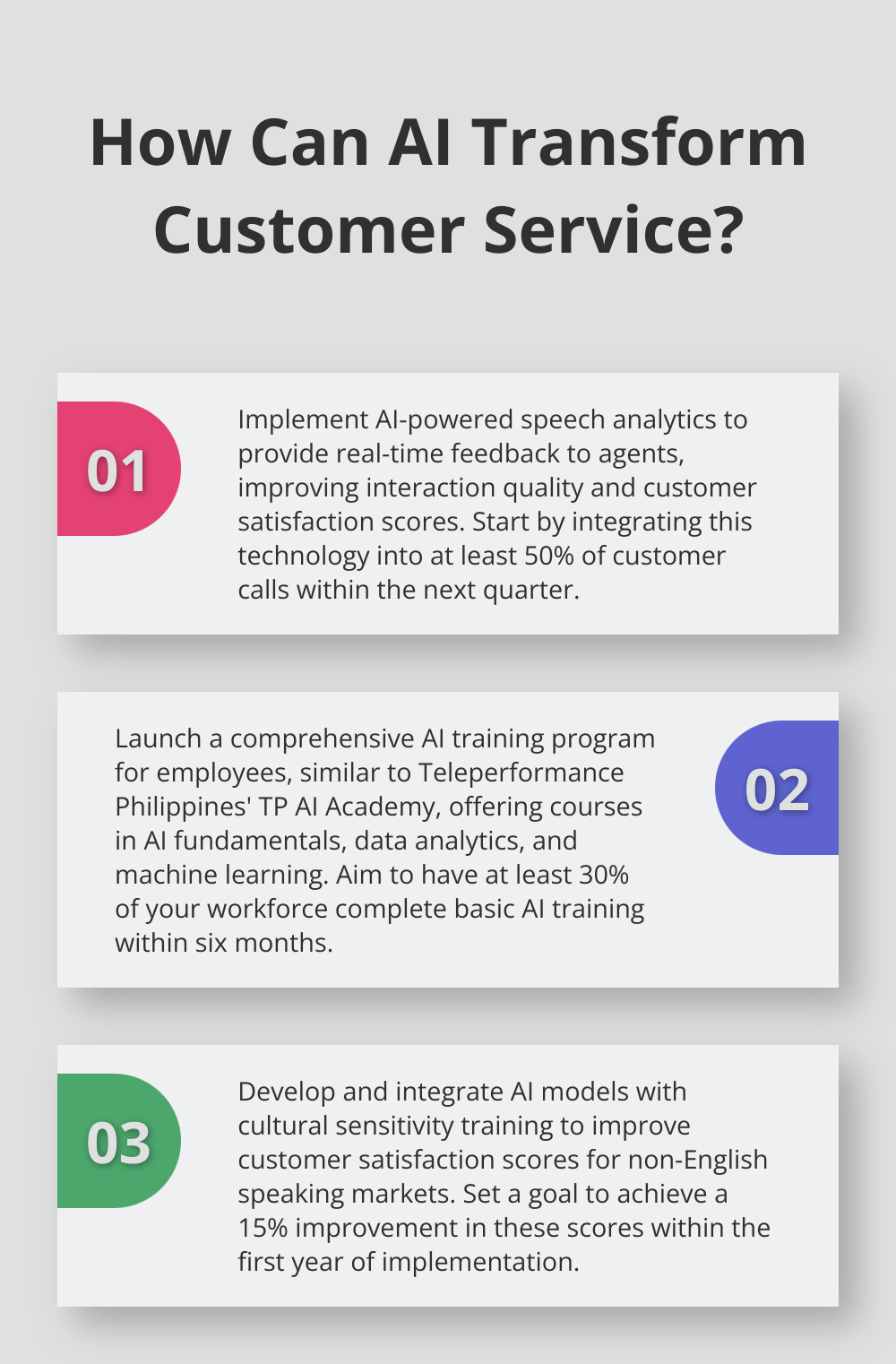
The future of AI in Philippine call centers looks promising. As AI technologies evolve, we expect more sophisticated applications to further revolutionize the industry. Ongoing investment in workforce development and the commitment to balance human touch with AI automation will keep Philippine call centers at the forefront of CX innovation.
Navigating this AI-driven landscape can challenge businesses seeking to leverage these advanced capabilities. Partnering with experienced outsourcing consultants becomes invaluable in this context. At Outsource Consultants, we optimize call center services and AI technology integration. Our expertise helps businesses make informed decisions about their outsourcing strategies, ensuring they benefit from the Philippines’ leadership in AI-powered CX.
Ready to Take the Next Step?
➡️ Get a cost proposal to compare your current provider with top-performing Philippines call center partners:
Free Call Center Cost Proposal
➡️ Book a CX Strategy Call to explore how AI-enhanced outsourcing can unlock innovation funding and elevate your entire customer experience:
Talk to a CX Strategist
FAQs About the Philippines Call Center Industry
1. How are Philippines call centers using AI in 2025?
They’re leveraging AI for chatbots, real-time analytics, predictive staffing, and multilingual support. This enhances both customer experience and operational efficiency.
2. What industries benefit most from outsourcing to the Philippines?
Retail, eCommerce, financial services, and healthcare are leading sectors due to their high volume of customer interactions and need for 24/7 support.
3. Are Philippines call centers secure enough for AI-driven data handling?
Yes. Most top-tier BPOs follow international compliance standards like GDPR and have advanced cybersecurity protocols in place.
4. Can I integrate my own AI tools with a Philippines call center partner?
Absolutely. Many providers offer flexible tech stacks and API integrations, or even co-develop solutions to align with your internal systems.
5. How do I know if my current BPO is leveraging AI effectively?
Start with a side-by-side cost and capability analysis. We offer these free to help you validate performance and identify gaps.


